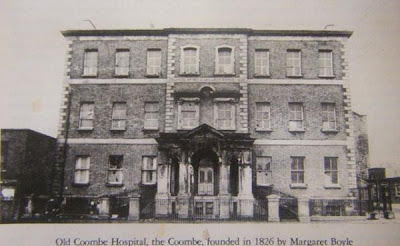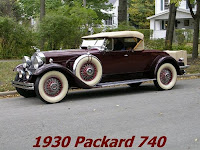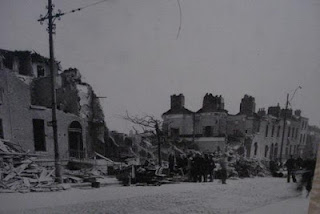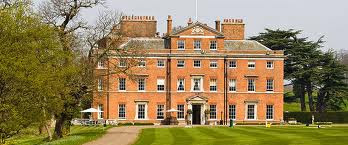This is the first in a series of post written Dr Diarmuid O'Driscoll looking back on a 60 year career in obstetrics and gynaecology. These pieces were first published in The Matrix, the newsletter of the Institute of Obstetrics and Gynaecology, RCPI, who have kindly agreed to there being made available on this blog.
In 1938 I did my district midwifery as a student in the old Coombe hospital in Dublin. In those days almost half of births were home births, and a fellow student and I would go to houses throughout the Liberties to assist, and report back, to the hospital. Each labour would take between one and two days and nights.
 |
| The old Coombe Hospital, Dublin |
Jobs in obstetrical medicine were scarce in those days, and emigration outlets few, mainly to the UK to try and get an assistantship or house job, or perhaps the armed forces. Another possibility was to do the DHP (Diploma in Health), which was offered by RCPI and took a year, this was a very useful qualification to have if one intended to subsequently apply for dispensary. Under the system County Dispensary Medical Officers (DMOs) served large areas and were relatively badly paid with maternity care comprising a large percentage of the workload. (The Health Act of 1970 brought to an end the system of dispensary which had existed in Ireland since the Medical Charities Act 1851.) Most people who took the DHP combined it with three months residence in one of the maternity hospitals during which time they secured the LM (Licence in Midwifery). I secured a post as a House Surgeon in the Mater Hospital, for which I was paid 25 shillings a week. This was the exact price of my keep in the Mater's lodgings for the same period of time. The idea being that if you worked hard in the early years monetary compensation would come later (though at the time this was not at all obvious). We house surgeons played poker incessantly in our free time, as we were house bond the whole day, every day.

During that time in Dublin there was the practice of bringing out a stop press, ordinarily one page in a newspaper, to announce some advancement. I remember one such stop press, which celebrated the alleged first pneumonectomy performed in this country by my Chief 'Packy' Smith in which I assisted. His nickname 'Packy' came from the fact that he always drove a massive American Packard automobile around Dublin while I was his Houseman.
I well remember the day that war was declared. I was a resident student in the Mater at the time and I happened to walk into the students' residence and turn on the radio to hear Neville Chamberlain say that on that day, 3 September 1939, England was in a state of war with Germany. A few incidents from those days stand out. I remember one night we were all playing poker and heard the sound of an aeroplane overhead. We decided to investigate and went out on the flat roof of the hospital residency to see the aeroplane flying in an easterly direction. Then, seemingly out of nowhere, the Irish Ack-ack guns opened up on the plane. None of us even knew Ireland possessed Ack-ack guns at the time. The plane got down as far as the North Strand when suddenly there was a colossal explosion and a huge sheet of flame shot up. What I later learned was that the plane was a German bomber which had flown off course and, thinking it was over Liverpool, dropped its bombs on the North Strand. Within minutes all hell broke loose.
 |
| Destruction on the North Strand |
The first causalities began appearing in the Casualty Department of the Mater Hospital within quarter of an hour. I happened to be the Casualty Officer on duty that night. At that time most casualties were brought to Jervis St., but on this occasion the Mater was the nearest hospital so most of the dead were brought there. There were hundreds of people suffering from minor injuries, and myself and the other five House Surgeons were kept up all night fixing small injuries, stitching wounds, and offering reassurance. This was my first experience of war, of which I was to become well acquainted. The bombs caused considerable damage in the North Strand area of the city, with 300 houses damaged or destroyed, 28 dead and 90 injured.
After completing my house job in the Mater I decided to move to England. I arrived in Manchester in the middle of a bombing raid and blackout with much of the city destroyed and in flames. People in Ireland at the time, myself included, had little idea of what the blitz was really like. Overall I would spend seven years in England, four of them during the war. One adopted a Stoic attitude - with the constant threat of bombings you had to. The sound of 'doodlebugs' in the air were particularly eerie, they flew above like an airplane, then once you heard the engine cut out you knew it was coming and ran for nearest cover, or just lay flat on the ground and waited for the ensuing explosions; but we got on with things and had the view that if your name was on it then what could you do? I had a couple of close escapes; I remember vividly a house across from where I was staying being reduced to rubble. After Manchester I went to London to work at the City of London Maternity Hospital (which claimed to be the oldest maternity hospital in the world, a claim disputed by the Rotunda, Dublin). In 1940 half of the Hospital was evacuated to Brocket Hall, near Welwyn Garden City, Herts. A week later, the northern wing was destroyed by a bomb but, fortunately, with no loss of life. Further bombs the following year destroyed the building entirely. Brocket Hall, where I lived during my time there, was then a sprawling estate of 20,000 acres, about twenty miles from London. Today it functions as a hotel and golf course. The expectant women from London would stay in local houses.
 |
| Brocket Hall |
After Brocket Hall I was working in Guilford, Surrey at the time of the D-Day invasion and I witnessed the preparations for this event, which was launched from nearby Portsmouth. After the invasion was launched the first casualties were back in Guilford within six hours. As part of the agreement between the British and Irish Governments to allow Irish Doctors practice in Britain during war time was that after two-three years they could be conscripted. I had insisted that I wanted to be a paratrooper, but was told that my stature was not suitable; instead I was called up to be a ship's surgeon in the Merchant Navy and was posted on a ship destined for the Pacific theatre of the war, namely Japan. En route we stopped in Buenos Aires to load meat and provisions and while we were there the atomic bomb was dropped on Hiroshima effectively ending the war.
Dr Diarmuid O'Driscoll